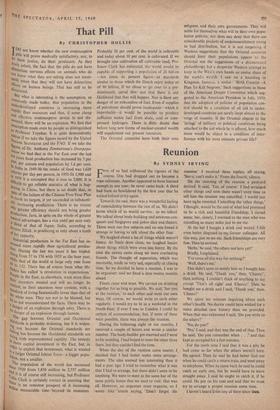Reunion
' By SYDNEY IRVING Flive of us had withstood the rigours of the course. One had dropped out to become a rope salesman. Another appeared to have learned enough in one year; he never came back. A third had been so bewildered by the first year that he waited behind to try again.
Towards the end, there was a wonderful feeling of comradeship between the rest of us. We didn't know which of us would survive : so we talked. We talked about body-building and amorous con- quests and Singapore and poker-dice and theatre. Those were our five subjects and no one found it strange or boring to talk about the other four.
We laughed about a lot of things which weren't funny. As finals drew close, we laughed louder about things which were even less, funny. By the time the exams came along we were everlasting friends. The thought of separation, which was inevitable, made us very sad, especially at closing time. So we decided to have a reunion. I was to be organiser; and we fixed a date twelve months ahead.
Finals came and went. We carried on drinking together for as long as possible. We said, 'See you at the reunion,' to each other and went our own ways. Of course, we would write to each other regularly. I would try to fit in a weekend in the North-East; if ever I was in London I could be certain of accommodation; but, if none of these were possible, there was always the reunion.
During the following eight or ten months, I received a couple of letters and wrote a similar number. The body-builder got married and I went to his wedding. I had hoped to meet the other three there, but they couldn't find the time.
When the day of the reunion came nearer, 11‘ decided that I had better make some arrange- ments. The idea seemed less interesting than it had a year ago. I tried to remember what it was that I had to arrange, but there didn't seem to be anything. We were to meet in the same bar of the same public house that we used to visit; that was all. However, an organiser must organise, so I wrote four letters saying, 'Don't forget the reunion.' I received three replies, all saying, 'Sorry, can't make it.' From the fourth, silence.
On the morning of the reunion a postcard arrived. It said, 'Yes, of course.' I had arranged other things and now there wasn't even time to tell him the reunion was cancelled; I would just have to be reunited. Cancelling the 'other things,' I thought, would be the end of what had promised to be a rich and beautiful friendship; I cursed some; but, slowly, I warmed to the man who was travelling so many miles just to see me.
At the bar I bought a drink and waited. I felt even better disposed to my former colleague. All this way, just to see me. Such friendships are very few. Then he arrived.
'Hello,' he said, 'the others not here yet?'
Briefly, I explained.
'I've come all this way for nothing?'
'Well, there's me.'
This didn't seem to satisfy him so I bought him a drink. He said, 'Thank you,' then, `Cheers!', then nothing. I couldn't think of anything to say except 'That's all right' and 'Cheers!' Then he bought me a drink and I said, 'Thank you,' then, 'Cheers!'
We spent ten minutes inquiring about each other's health. No doctor could have wished for a more detailed case history than we provided. When that was exhausted I said, 'Do you write to the others?'
'No, do you?'
'No,' I said, and that was the end of that. Then he said, 'Do you remember when . . .' and that kept us occupied for a few minutes.
For the tenth time I said that it was a pity he had come so far when the others weren't here. He agreed. Then he said he had better find out when he could catch a return train, and went away to telephone. When he came back he said he could catch an early one, but he would have to leave straight away. I said he ought to catch it, if he could. He put on his coat and said that we must try to arrange a proper reunion some time.
I haven't heard from any of them since thee.


































 Previous page
Previous page